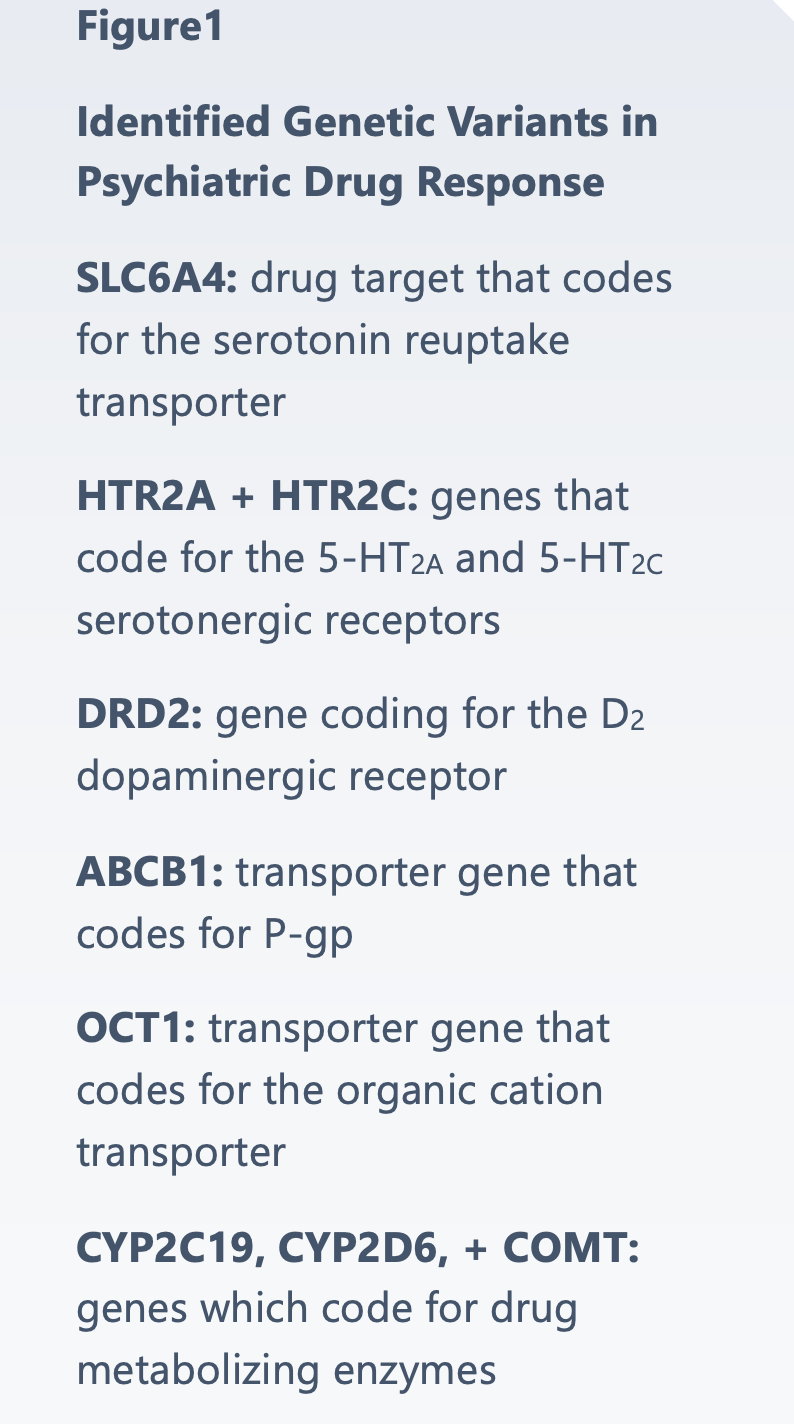News
Article
The Latest in the Role of Pharmacogenomics in Mental Health Treatment
Author(s):
Pharmacogenomic testing in combination with therapeutic drug monitoring can be a cost effective and efficient way to advance psychiatric drug therapy.
Pharmacogenomic testing refers to the use of gene sequencing technology to identify pharmacogenetic biomarkers, or genetic variants that can influence the metabolism, therapeutic effects, and adverse effects of medications.
Image Credit: Adobe Stock - motortion

“Pharmacogenomics is well developed in oncology and is currently expanding in psychiatry.”1
The next steps will be to advance the world of pharmacogenomics to become part of routine care in psychiatry and other applicable disorders.
Mental health is an essential component of one’s emotional and physical wellbeing, as well as critical for the ability to engage in daily life activities and in society.1 Unfortunately, in correlation with the COVID-19 pandemic, the world saw a rise in mental health disorders, and the numbers do not seem to be decreasing. The National Institute of Mental Health estimates that 22.8% of US adults and 49.5% of US adolescents currently live with any mental health disorder.2
Despite the rise in mental health disorders, there has been scarce advances in psychiatry to improve the success rates of medications and improve patient’s lives. For example, the current antidepressant drug response success rate only sits at 42%-53% for patients with major depressive disorder.1 It is time to advance pharmacogenomics in psychiatry to enhance mental health care.
Pharmacogenomics in Psychiatry
Every patient will respond differently to psychiatric medications due to differences in genetic, environmental, pathophysiological, and dietary factors.1 The most important factors for differing drug response rates are drug-drug interactions and genetic composition.1 Pharmacogenomic biomarkers, or genetic variants associated with drug treatment response, can be utilized to streamline and individualize drug treatment for individuals.
Genetic variants in drug targets, transporter genes, and genes encoding drug metabolizing enzymes have been found to be associated with psychiatric drug response (Figure 1). The most important of these are the genetic polymorphisms found in the CYP2C19 and CYP2D6 genes, which encode for the CYP2C19 and CYP2D6 metabolizing enzymes, respectively.
Identified Genetic Variants in Psychiatric Drug Response

Patients carrying genetic variants of these drug metabolizing genes are further classified into metabolizer categories: normal metabolizer, poor metabolizer, intermediate metabolizer, and ultra-rapid metabolizer. Normal metabolizers have gene variants that code for normal metabolism, poor metabolizers lack a functional gene, intermediate metabolizers have partially defective genes leading to reduced enzyme ability, and ultra-rapid metabolizers have gene variants that produce greater than normal enzyme activity.1
The majority of antidepressant and antipsychotic medications rely on CYP219 and/or CYP2D6 metabolism, and therefore different metabolizer statuses can lead to variable drug levels and responses. Most of the available antidepressant and antipsychotic drugs will have specific dosing parameters in the package inserts pertaining to the CYP2C19 and CYP2D6 genotypes.
Analysis of various studies and 14 meta analyses found significant differences in exposure to aripiprazole (48%), risperidone (36%), and haloperidol (68%) when comparing the different CYP2D6 metabolizer groups.1 In terms of common antidepressants, fluoxetine (2.9 fold) and venlafaxine (2.1 fold) exposure rates were found to be increased in CYP2D6 poor metabolizers and intermediate metabolizers as compared to normal metabolizers.1
These examples signify the importance and need for pharmacogenomic testing to drive forward psychiatric and antidepressant drug therapy. Pre-emptive CYP genotyping can be used to help select the correct medication and dose based on the patient’s individual CYP genotypes to ensure higher drug success rates and increased patient satisfaction and care.
Therapeutic Drug Monitoring (TDM)
TDM refers to the periodic obtainment of serum drug levels to reference the levels to therapeutic or reference ranges. TDM is commonly completed for narrow therapeutic index medications, but there is also a role for TDM with other medications.
As previously mentioned, many factors can contribute to the variability seen within drug responses. These include drug-drug interactions leading to phenoconversion to a different metabolizer category, impaired kidney or liver function, and dietary habits. TDM can act as tool to help identify all the sources that can contribute to variable drug pharmacokinetics and response rates.
According to Jukic M., et al, “the use of pre-emptive CYP2C19/CYP2D6 genotyping to predict individual dose requirements during initiation of psychiatric drug treatment with follow-up by TDM is currently the best attainable way to ascertain the optimal drug exposure for every patient and subsequently to improve treatment outcomes.”1
Variability of Drug Pharmacogenomic Parameters
Unfortunately, pharmacogenomics is not as straight forward as this article may have led you to believe. Currently unknown genetic factors contribute to ~60% of the variability of drug response rates seen within individuals, indicating that more specific parameters, in addition to the defined metabolizer categories, will need to be addressed.
Proposed theories that can contribute to the variability of drug response rates include rare variants; incomplete next-generation sequencing; functionally different haplotypes; variant substrate specificity; indirect genetic variant contribution; and polymorphic nuclear factors that regulate pharmacokinetic genes.1 It is expected to see more research completed in this field in the near future in order to identify all genetic factors that contribute to variable drug response for each medication available.
Considerations
Currently, routine pharmacogenomic testing and TDM are not commonly used in the world of psychiatry and mental health. Reasons for this include clinician hesitancy to this new science, lack of knowledge surrounding pharmacogenomics, cost, and patient hesitancy toward gene sequencing.
However, according to many recent studies and common knowledge, pharmacogenomics can be extremely useful in identifying an effective drug at an effective dose for patients with variable metabolizer statuses. Increased prescriber and patient education should be performed to help spread awareness of the safety and success seen with pharmacogenomics in psychiatry.
Looking forward, as pharmacogenomics become more predominant in the health care world, pharmacists can become key players in pharmacogenomic management. Pharmacists will be able to assist in drug selection by confirming an appropriate drug and dose based on the patient’s genotype, as well as assisting with the TDM process to ensure adequate drug levels, therapeutic response, and adverse effect avoidance.
References
- Jukic M., Milosavljevic F., Molden E., Ingelman-Sundberg M. Pharmacogenomics in treatment of depression and psychosis: an update. Trends Pharmacol Sci. 2022;43(12). doi: 10.1016/j.tips.2022.09.011.
- National Institute of Mental Health. Mental Illness. https://www.nimh.nih.gov/health/statistics/mental-illness. Published March 2023. Accessed April 15, 2023.
About the Author
Ashlee Wertman, PharmD, completed this research during an Advanced Pharmacy Practice Rotation at STACK, focused in specialty pharmacy, technology, and entrepreneurship. For more information about completing an APPE at STACK, visit managewithstack.com.
Newsletter
Stay informed on drug updates, treatment guidelines, and pharmacy practice trends—subscribe to Pharmacy Times for weekly clinical insights.





